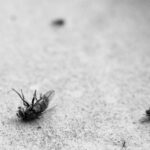Horse flies are notorious for their painful bites, especially during the warmer months. But Can Horse Flies Bite? The simple answer is yes, and their bites can be quite bothersome. Understanding why they bite, what to expect from a bite, and how to protect yourself can help you better manage these pesky insects.
Why Do Horse Flies Bite? The Female Factor
It’s important to clarify that only female horse flies bite. Male horse flies are different; they primarily feed on nectar and pollen from flowers, playing a role in pollination. The female horse fly, however, requires blood to develop her eggs. This need for blood is why they target mammals, including horses, cattle, and humans. They are equipped with scissor-like mouthparts that slice into the skin to lap up blood, unlike mosquitoes that have piercing-sucking mouthparts. This cutting action is what makes a horse fly bite so painful.
What Does a Horse Fly Bite Feel Like? Symptoms and Sensations
A horse fly bite is often described as a sharp, stabbing pain felt immediately as the fly bites. You might feel the initial prick and then a more intense burning or stinging sensation as the female horse fly cuts into your skin. Because they sever the skin rather than piercing it cleanly, the bite can bleed more than a mosquito bite.
Common symptoms of a horse fly bite include:
- Immediate sharp pain: Unlike some insect bites that you may not initially feel, a horse fly bite is usually instantly noticeable and painful.
- Bleeding: The bite site may bleed due to the way horse flies cut into the skin.
- Redness and swelling: The area around the bite will likely become red and swollen.
- Itching: As with many insect bites, itching is a common symptom as your body reacts to the bite.
- Wheal: A raised, hive-like bump (wheal) can form at the bite site.
- Potential for infection: While not common, scratching the bite can introduce bacteria and lead to a secondary infection.
In rare cases, some individuals may experience allergic reactions to horse fly bites. Signs of a severe allergic reaction, requiring immediate medical attention, include:
- Difficulty breathing or wheezing
- Dizziness or lightheadedness
- Swelling of the face, lips, or tongue
- Hives spreading beyond the bite area
How to Protect Yourself from Horse Fly Bites
Preventing horse fly bites is always better than dealing with them after they occur. Here are effective strategies to minimize your risk:
- Clothing choices: Horse flies are attracted to dark colors. Wearing white or light-colored clothing can make you less appealing to them. While the original article mentions ticks and white clothing, for horse flies specifically, lighter colors are recommended.
- Insect repellents: Repellents containing DEET or permethrin can offer some protection. Apply insect repellent to exposed skin, but avoid applying permethrin directly to your skin; instead, treat clothing with permethrin. Note that repellents might be less effective against horse flies compared to mosquitoes, but they can still provide a degree of deterrence.
- Traps: For localized areas like gardens or patios, horse fly traps can be helpful. Sticky traps or malaise traps are commercially available and can reduce horse fly populations in a specific area. The idea of shiny, dark objects that horse flies are attracted to can be utilized in trap designs.
- Environmental management: Horse flies breed in damp areas. Reducing standing water around your property can help decrease their breeding sites. Clearing vegetation might also reduce harborage areas for these flies.
Treating Horse Fly Bites
While horse fly bites are painful, most can be managed at home. Here’s how to treat a horse fly bite:
- Clean the bite area: Wash the bite site gently with soap and water to reduce the risk of infection.
- Cold compress: Apply a cold compress or ice pack to the bite area to help reduce swelling and pain.
- Over-the-counter pain relief: Pain relievers like ibuprofen or acetaminophen can help manage pain and discomfort.
- Antihistamines: If itching is bothersome, an over-the-counter antihistamine can help alleviate the itch.
- Topical creams: Calamine lotion or hydrocortisone cream can also help soothe itching and inflammation.
When to seek medical attention: Most horse fly bites heal on their own with home care. However, seek medical attention if you experience signs of infection (increased pain, redness, pus, fever) or a severe allergic reaction as mentioned earlier.
Takeaway
Yes, horse flies can bite, and their bites are typically painful due to their cutting mouthparts and the female’s need for blood. By understanding why they bite, how to protect yourself, and how to treat bites, you can minimize the nuisance of horse flies and enjoy the outdoors more comfortably. While generally not disease vectors like some other biting insects, their bites can be irritating and sometimes require medical attention, especially in case of allergic reactions or secondary infections.
